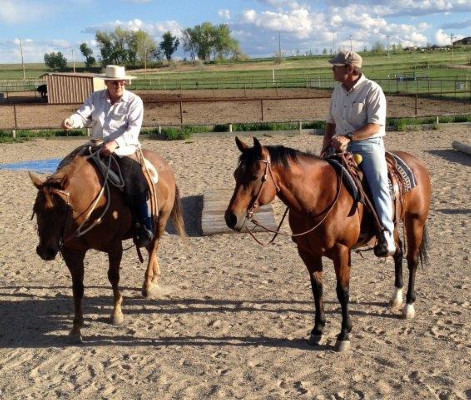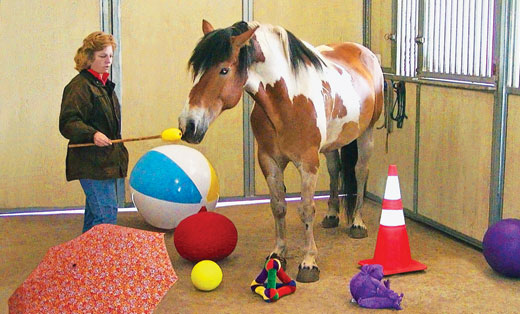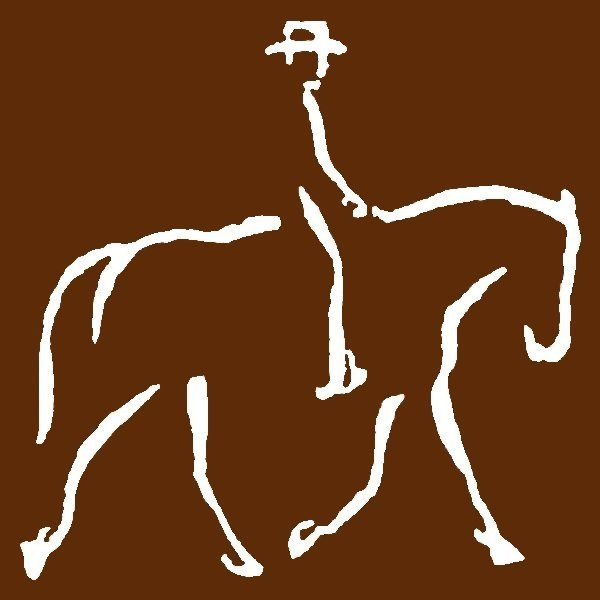When I first wrote “The Nature of Natural” in 2004 I was trying to connect all of the proven methods of training horses with principles that are found in Nature, thus the name “The Nature of Natural”. At that time and to this day, I have been an advocate and student of Tom Dorrance and Ray Hunt, not to mention many others that were taught by them and followed in their footsteps taking their philosophies of training to new levels.
When I first met Ray and later Tom, I was looking for a better a way to get along with my horses that seemed in sync with horses and who I was. When I was training Schutzhund dogs I was in sync with them and thought there must be people out there use the same approach with horses.
Of course back in the day there was no Google and no Google it for an answer. I did what we all did back then, I started asking people. One of those people was a vet. He said “well why don’t you go see Ray Hunt” and I did. Meeting Ray opened my eyes to a new way of interacting with horses that worked for both the horse and me. After attending several clinics of Ray’s that summer I went to California in the winter and was fortunate enough to meet Tom and Bill Dorrance along with Bryan Nuebert and others. At that point the old saying.
“you don’t know, what you don’t know” was a very profound statement. At times I felt overwhelmed by how little I seemed to grasp and how to proceed. After being around Tom, and admittedly for very short periods, I found myself asking “what would Tom do”. I wondered because when you saw him work it all seemed to go smoothly and without much conflicting behavior from the horses. At times, Tom claimed he was the horse’s lawyer and the horses surely seemed to have gotten the right man on their side.
As years passed I interacted with lots of horses on my job and I started to seek out great horseman from all disciplines. As I found, observed and worked with these people I came to believe there were root principles that all of them were using as they implemented their own techniques. It was during this time, what Tom and Ray had put forward many years earlier became known as Natural Horsemanship.

During my education as a horseman, the sayings or advice of Tom and Ray always seemed to ring true, no matter what others said. They were always working with the horses mind. Tom once said “if you get the mind the body will follow”. As I looked into this and continued to study animal behavior I found that what they were saying was rock solid in terms of behavioral principles. Through a life time of observation, practice and experience they had gleaned what occurred in nature and the very foundations of what science calls Learning Theory.
From these experiences I wrote “The Nature of Natural”. Today, the International Society for Equitation Science promotes a science based ethical program to train horses. I have become a member and continue to support Learning theory in the training of horses. Since I wrote the original Nature of Natural there has been a considerable amount of research done with horses since that time that continue to enlighten us to the inner world of horses.
The ability of animals to learn is being documented daily. It far exceeds what we previously believed and opens the possibility that some species may be able to reason. Any scientist that reads this will probably cringe as it has not been conclusively proven. However, there is evidence that it may be true and this should not be a surprise to those that are interested in science particularly evolution. John Pilley and his dog Chaser (see Chaser the book) have given the canine world a boost in this direction, along with Alex the parrot and perhaps Dr. Hanggi’s research with horses.

As we understand more of the evolutionary processes one of the basic understandings is that evolution builds on traits or forms that came before.
An example of this is dopamine and it turns out humans are not the only species capable of remembering positive and negative events. Even the humble fruit fly has this capacity. (Dopamaine: A Substance with many messages. https://www.sciencedaily.com/releases/2012/07/12071813155.htm)
Evolution doesn’t create whole new concepts that come into being, it builds on what was already there and occurred for some survival advantage. This is done through mutations. Mutations occur and some produce an advantage that are passed on and may eventually lead to whole new species. Given this process, it may not be unreasonable to believe that the roots of reasoning occurred long before humans took the ball to what we believe is the eighth level of learning abilities and Bi-conditional concepts. In short critters seem to be smarter than we in the past have given them credit. Horses tend to have brain characteristics that suggest their learning mechanisms may be similar to those of humans (Hahn 2004), as is the case for canids and probably most if not all other mammals. With this in mind if we can understand those mechanisms and principles, then training and behavioral problems can be more easily diagnosed and solved in an ethical and compassionate way.

Essentially that was the premise when I introduced “The Nature of Natural “, naively believing that as soon as people read it they would get it and their immediate training questions would be solved or at least they would have a process to do so themselves. After all, scientists regularly train lab animals to do all sorts of things without being animal trainers. They just stick to the principles. The idea of teaching people to fish instead of giving them fish seemed like it would catch on quickly. As you might well have guessed it didn’t go that way and to this day when I talk about science, most folks still want the fish. Well, I’m back, but don’t panic just yet and try to keep reading. I will explain or at least try to explain, the principles that are set forth in Tom Dorrance, Ray Hunt and other great horsemen’s historical sayings. Since I am most familiar with Tom and Ray I will start with them. We welcome questions on our web site in regard to this and will be undertaking this endeavor in several installments. So stay tuned and let’s have some fun and learn why Nature is truly AMAZING!

Although I have said nature is amazing and I truly believe that, but let’s simply say horses are amazing, as they are part of nature. In that regard, understanding how they came to be in nature and how they have managed to survive plays a big role in how we train horses. To have a deeper understanding of how this all relates we will be calling in many studies, experts and of course our old friends Tom and Bill Dorrance and Ray Hunt, along with many of their disciples. The root of it all is that they were essentially using scientific based principles. The basic text regarding those principles is written in many places however, as they relate to horses the book we will consider our text book is “Equitation Science” by Paul McGreevy and Andrew McLean. I will recommend many other books as we proceed and of course all the written or spoken materials from Tom, Bill, and Ray (see web site for specifics and sources).
I highly encourage everyone interested in horses, no matter what their current skill level to read “Equitation Science” and with that in mind I will take the liberty to liberally quote McGreevy and McLean. Tom Dorrance, often said the horse only has self-preservation and when the rider and trainer fail to recognize that the horse doesn’t understand and has moved to that level of conflict then the problems begin. There is no doubt that horseback riding is a dangerous sport and ranks right up there with motorcycling, skiing, football and rugby. Those problems are most often caused by the human and often from a lack of understanding of the situation and trying to force a behavior or situation that is inappropriate at that moment. That kind of thinking by people often comes from a poor education in equine science.

The Nature of Natural program aims to help riders, trainers, horse owners and equine lovers have a better understanding of the nature of horses. Using tried and true sayings from horse trainers to show how they apply to learning theory will be one of the means we do this. Many of the so called underlying principles that people learn are totally wrong as far as science is concerned. Often times horse trainers offer their own versions of what is going on and at times they couldn’t be further from the empirical evidence currently available.
To demonstrate this here is a quote from McLean’s book:
“In some sectors of horsetraining, such as the sport of dressage, the cues and signals used to elicit alterations in the mobility and posture of horses are known as ‘aids’. This word is antique in origin, derived from the French verb ‘aider’, meaning ‘to help’. The notion that cues in any way offer assistance to horses is anthropocentric and has been abandoned in our text because it nourishes the notion of the ‘benevolent’ horse, the horse that is a willing partner. Horsetrainers should respectfully recognize that training is an act of equine exploitation rather than equine enlightenment, and modern equitation must take full account of the cognitive processes of the horse.”
Although, this paragraph specifically refers to the language of dressage it is true for all disciplines, as they all use similar language that leads people to believe the approach they are using is in sync with nature. In many cases it is simply not true, and a better understanding of Learning Theory, ethology and evolution will help trainers, riders and horse lovers towards a more enlightened approach to their equine friends.
The Nature of Natural program will follow these principles while trying to relate them to other great horseman that readers may be more familiar. At the same time courses, clinics and lessons will employ technologies such as heart rate monitors, Heart rate variability, video and GPS. The advanced version of these technologies is currently being developed but we will continue to stay abreast and bring the best monitoring to produce accurate data to our clients. At the same time we will be offering our knowledge from projects we have taken part in and be actively seeking more projects to tackle.
Our curriculum will be interesting and challenging especially from an intellectual perspective. Many of you, if not all will be familiar or maybe down right handy at the techniques, however, how and when we apply them may be different for you. Please come join us in the exciting world of equitation science.

